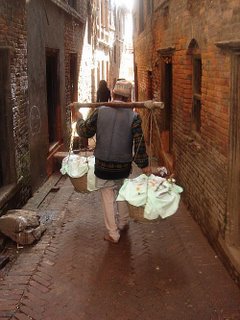 Morning in the Magic Kingdom
Morning in the Magic KingdomMy mind was so restless, awash in a sea of seemingly endless destinations (
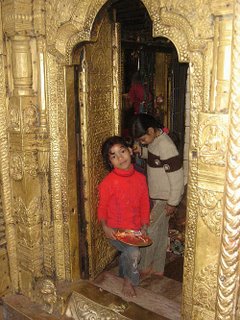 rides) and fake fleece jacket. Wrapping a cotton scarf round my ears, I trotted down the marble stairs. On the rooftop of a neighboring guest house, a Nepali woman wearing sari and shawl was solemnly waving her offering tray of a flaming ghee lamp, rice and red powder before a potted sacred Tulasi plant (revered by Hindus, tulasi is a form of basil and a cure-all for many illnesses. They're not actually just worshipping the plant, it represents a manifestation of the goddess).
rides) and fake fleece jacket. Wrapping a cotton scarf round my ears, I trotted down the marble stairs. On the rooftop of a neighboring guest house, a Nepali woman wearing sari and shawl was solemnly waving her offering tray of a flaming ghee lamp, rice and red powder before a potted sacred Tulasi plant (revered by Hindus, tulasi is a form of basil and a cure-all for many illnesses. They're not actually just worshipping the plant, it represents a manifestation of the goddess). In the hotel lobby, all was silent. The TV that usually plays Hindi movies wore a dark glassy face for once. I heard the watchman snoring under a blanket on the sofa and noticed another employee slumped in a plush chair in the corner. Many of these folks work a 14-hour shift and I figure their snooze was well-deserved. I slipped out the front gate surreptitiously, knowing in their paternal fashion they would be alarmed (Didi? You go out so early?) if they saw me leave.
Before all the yuppies and hippies and trekkies come out in their North Face gear and expensive leather hiking boots, before all the wooden flute and Tiger Balm hawkers appear, the streets still belong to working Nepali people, wearing flip flops (yes, plastic flip flops). You barely see these people once the day gets underway, but they are the underpaid underpinnings of the tourist district. Old Kathmandu's streets are really glorified alleyways, originally made for oxcarts and bicycles, now pushed beyond capacity by mini taxis, motorcycles, scooters, an occasional absurd full-sized car or van full of tourists, riotously painted cycle rickshaws and, of course, the pedestrian crowds and accompanying hawkers that shadow them carrying prayer beads, Tiger Balm and all manner of junk. But now it's still dark, a crescent moon floating serenely over the buildings. Soon the sun will rise to reveal a cluttered canyon of neon signs (Trekking! Safari! Ayurvedic massage! Pizza! Real Nepali daal bhaat! Tequila bar with dance! Deluxe room with TV for normal price! Le Bistro, best food...)
It 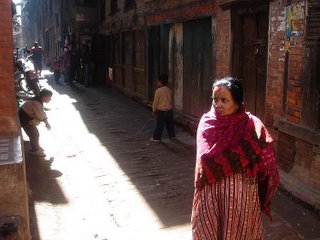 is chilly in the AM now, but not yet cold enough to see your breath. A woman squats huddled over a kerosene stove (you know, the kind that are impossible to light) on the corner in front of all the closed metal shop gates. She's making tea in tiny glasses for all the men squatted on the pavement around her. In a couple hours these shops will open and sell elegant cashmere and raw silk scarves to the tourists. All the Nepali ladies scurry by swathed in woollen shawls, which gives them an added dignity they didn't have this July, sweating in warmer weather. A small army of industrious ladies, the tallest of them standing
is chilly in the AM now, but not yet cold enough to see your breath. A woman squats huddled over a kerosene stove (you know, the kind that are impossible to light) on the corner in front of all the closed metal shop gates. She's making tea in tiny glasses for all the men squatted on the pavement around her. In a couple hours these shops will open and sell elegant cashmere and raw silk scarves to the tourists. All the Nepali ladies scurry by swathed in woollen shawls, which gives them an added dignity they didn't have this July, sweating in warmer weather. A small army of industrious ladies, the tallest of them standing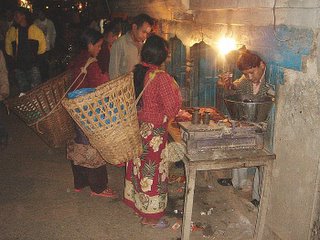 about five feet, sweep dust and bits of trash from in front of each shop into the edge of the gutter, bent over those inexplicable handle-less brooms that are just bits of straw tied together. (They will not straighten up and use a handle broom, which could save their spines. If you give them a push broom they don't know what to do with it. No mops either - rags are used to clean floors while squatting. Some people say this makes them more flexible, but I see an awful lot of old folks bent over at a 90 degree angle, presumably from a lifetime of this. They also have a tradition of carrying things on their backs strapped to their heads here using the baskets called Dhokus. I've never seen this method once in all of
about five feet, sweep dust and bits of trash from in front of each shop into the edge of the gutter, bent over those inexplicable handle-less brooms that are just bits of straw tied together. (They will not straighten up and use a handle broom, which could save their spines. If you give them a push broom they don't know what to do with it. No mops either - rags are used to clean floors while squatting. Some people say this makes them more flexible, but I see an awful lot of old folks bent over at a 90 degree angle, presumably from a lifetime of this. They also have a tradition of carrying things on their backs strapped to their heads here using the baskets called Dhokus. I've never seen this method once in all of
A family of ragpickers processed down the street, led by a toddler in traditional Nepali clothing who proudly marched in front of them carrying a stick like a parade leader's baton, waving it as though conducting a band. You could almost hear the military music playing in his little head. He was followed by a brother and his mum (grandmum?) who carried strapped to her back a load of flattened cardboard boxes. Another group of ragpickers, or should I say recyclers, sorted thoroughly and thoughtfully through the trash that had been swept into the gutter (these "recycling" groups always seem to be single women with their kids). Unsoiled cardboard boxes, glass and plastic bottles were retrieved and dropped into the mother's plastic gunny sack. I noticed they seemed to be in a bit of a hurry, then saw at a distance down the block the "real" garbage man. He pushed a bicycle with a large metal box attached to the back, and scooped up the garbage using 2 matching pieces of metal the size of license plates, then dumped it scoop by scoop into his bike bin. The family were on a deadline - they had to beat the Sanitation Dept. to the pickin's.
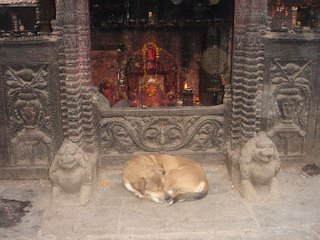 Scruffy, scabby but friendly street dogs nosed through the flotsam and jetsam alongside their human counterparts, one ragpicker toddler ate a bit of food he'd found, then offered it to his canine pal who sniffed it, then turned away disinterested. The moon had disappeared behind a sign advertising "chilled beer and Mexican food."
Scruffy, scabby but friendly street dogs nosed through the flotsam and jetsam alongside their human counterparts, one ragpicker toddler ate a bit of food he'd found, then offered it to his canine pal who sniffed it, then turned away disinterested. The moon had disappeared behind a sign advertising "chilled beer and Mexican food."
Bicycle bells chimed as men wearing the traditional Topi hat cycled past to deliver milk, in plastic packets, out of plastic boxes strapped with bungee cords to the rear fenders of their bikes. Sometimes you still see the tall, metal milk cannisters swinging from handlebars. Newspapers are delivered to subscribing shops the same way (folded into plastic bags, then strapped to the bike back).
I saw my favorite waiter Hari from Northfield Cafe showing up to work (
In a couple hours, the street would be awash in the sounds of "hip" folk and rock music (and the occasional Tibetan chant) blaring from the music shops for the benefit of the foreign visitors. For now, it was nice to sip scalding sugary tea and hear only the roar of the kerosene flames, the swoosh of the straw brooms, the ching of the bike bells, and the mom scolding her kid for playing in a bit of garbage deemed too dirty for even a ragpicker.
I felt a tug on my sleeve. It was one of the filthy-faced urchins, who just moments ago had been cavorting with the street dogs. "Palease." Cover blown; I'd been spotted. "Palease" - that was my cue, time to retreat upstairs to the haven of my gated community. The moments of relative relaxation were over for them too - now there were foreigners to interact with, to do business with; he could no longer be himself. He had a job to do, he was on the clock. Down the street, the music shop's metal gate rasped open and soon two cows were trotting down the street to a soundtrack of Tracey Chapman. Why can't I see this video on MTV?










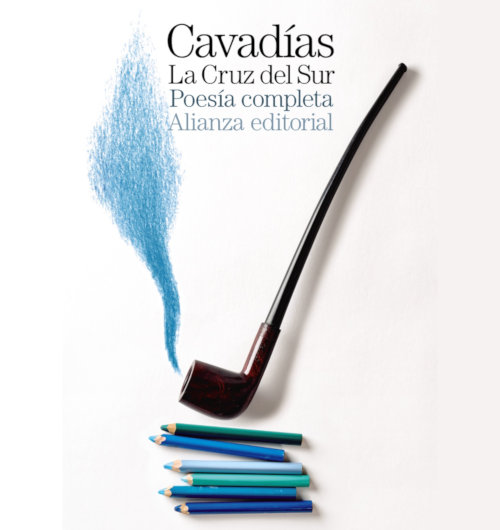



2 comments:
In High School I worked summers for a Boardwalk amusment park. In the early mornings I would walk the boardwalk as the consessions opened before the "carnival" of tourist arrived for the day. Your post took me back to that place and feeling.
Thanks for tuning in and writing, Byron!
Post a Comment